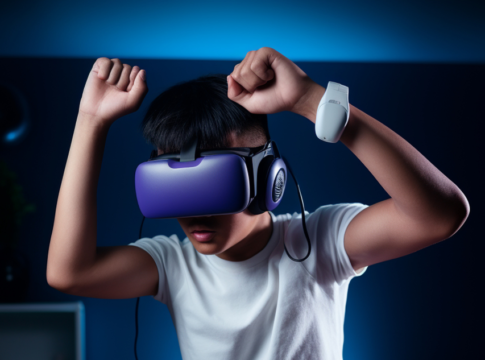Virtual Reality (VR) is rapidly becoming a game-changer in the world of sports, offering innovative tools for training and performance enhancement. By immersing athletes in realistic, interactive environments, VR provides a unique approach to improving skills, strategies, and overall performance. As the technology continues to evolve, its applications in sports are expanding, promising to transform how athletes prepare for competition and optimize their abilities.
Enhancing Training Regimens
One of the most significant ways VR is impacting sports is through the enhancement of training regimens. Traditional training methods often involve repetitive drills and exercises that may lack the variability and complexity of actual game situations. VR addresses this limitation by simulating realistic scenarios and environments, allowing athletes to practice and refine their skills in a controlled yet dynamic setting.
For instance, basketball players can use VR to practice shooting and defensive maneuvers against virtual opponents, replicating the pressure and intensity of a live game. Football players can run through plays and strategies in a virtual stadium, helping them understand formations and improve decision-making. By immersing athletes in these virtual experiences, VR helps them build muscle memory and mental resilience, leading to better performance on the field.
Improving Cognitive Skills and Strategy
VR is not only beneficial for physical training but also for enhancing cognitive skills and strategic thinking. In sports, the ability to make quick decisions and anticipate opponents’ moves is crucial. VR simulations can replicate complex game scenarios, enabling athletes to practice their strategic thinking and reaction times in a risk-free environment.
For example, a soccer player can use VR to analyze different game situations, such as positioning, passing options, and defensive strategies. By repeatedly experiencing these scenarios, players can develop a deeper understanding of game tactics and improve their ability to make split-second decisions. This cognitive training complements physical practice, leading to more well-rounded and effective athletes.
Analyzing Performance and Technique
Another critical application of VR in sports is performance analysis and technique refinement. VR systems can capture and analyze athletes’ movements, providing detailed feedback on their technique and form. By reviewing their performance in a virtual environment, athletes and coaches can identify areas for improvement and make necessary adjustments.
For example, a swimmer can use VR to analyze their stroke technique and body position, while a golfer can assess their swing mechanics and follow-through. This detailed analysis helps athletes make precise adjustments to their technique, leading to improved efficiency and performance.
Enhancing Recovery and Rehabilitation
VR is also proving valuable in the recovery and rehabilitation process for injured athletes. Traditional rehabilitation exercises can be monotonous and challenging, often leading to decreased motivation and slower progress. VR offers engaging and interactive rehabilitation experiences that can make the recovery process more enjoyable and effective.
For instance, athletes recovering from injuries can use VR to perform customized exercises that simulate real-life movements and activities. This not only aids in physical recovery but also helps athletes regain confidence and motivation during the rehabilitation process. VR-based rehabilitation can also be tailored to individual needs, providing personalized and targeted support.
Creating Competitive Advantages
As more sports organizations and teams adopt VR technology, athletes who utilize these tools will likely gain a competitive edge. The ability to practice in immersive environments, analyze performance in detail, and enhance cognitive skills can set athletes apart from their competitors. Embracing VR as part of a comprehensive training program can lead to significant improvements in performance and overall athletic success.
Conclusion
VR is revolutionizing sports training and performance enhancement by providing athletes with immersive, interactive tools to improve their skills, strategies, and overall performance. From refining techniques and cognitive skills to aiding in recovery and rehabilitation, VR offers a wealth of benefits that are reshaping how athletes prepare for competition. As technology continues to advance, the role of VR in sports is set to expand, offering new possibilities for optimizing athletic performance and achieving success.
